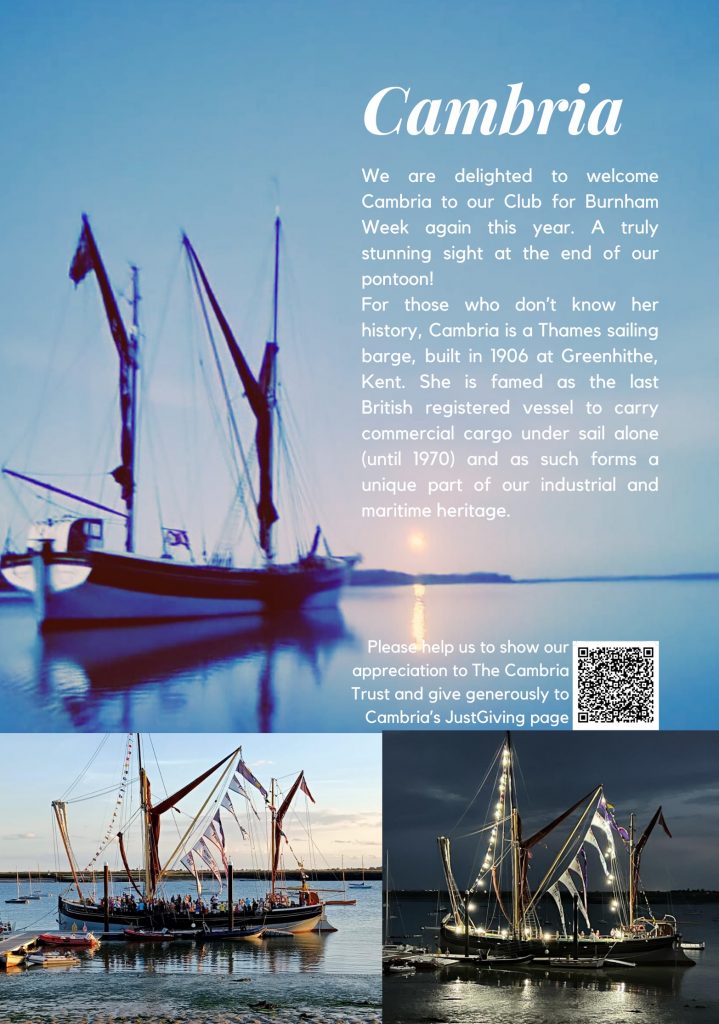August 2023

Chairman’s Fetch October 2022
Last week I leaned over the bowsprit end and watched Cambria’s stem pushing through the early morning sunlit wavelets of the East Swale and pondered on time’s tides.
How lucky we all are – Ian Ruffles, the skipper, Shiner, the mate, and the rest of us – all helping to heave on this, wind on that, or make the tea aboard a vessel which had it not been for a dedicated crew of experts would have ended up as blackened frames in a Kentish ditch.
They include Bruce Richardson along with Chris Snelling, and many others who brought a lifetime of experience to ensure Britain’s last sailing trading ship continued to be just that.
A big thank-you to all of them.
We had some glorious Autumn weather and the grand old lady pushed over the flood as we sailed down Swin with a light north-west wind filling every sail we could set including the mule-mizzen, bowsprit jib and jib topsail.
The wind fined away after we lay through the Spitway and we brought up for the night inside the North West Knoll. Our motive power of wind now gone and our baseline of support now against us as the ebb came away. The anchor and a good few fathom of chain was, instead, our guarantee of security in an exposed world.
Riding light aloft we settled down for a meal between the seven of us and a peaceful night with the clanging steel leeboards hauled up into silent submission.
The following morning – the penultimate day of September – saw us creeping into the River Blackwater with a light northerly wind in brilliant sunshine.
After bacon, sausage and egg butties for breakfast Cambria’s great profile slid round into Lawling Creek, and Beccs and Charlie were there to nudge and tug us into our winter berth at Blackwater Marina.
May the whipping twine, caulking hammers and paintbrushes begin their season…
Dick Durham
Chairman’s Fetch August 2022
Had I expected a sedan chair when I accepted the role as Chairman of the Cambria Trust I would have been disappointed, as any porters available were too busy scraping the barge’s bottom and replacing the anti-foul paint.
I was offered a bosun’s chair, however, and invited to go aloft to attend to a worn serving.
And that’s because everyone involved in the sailing, upkeep and management of the last engineless vessel to carry cargo under the Red Ensign in Great Britain and Northern Europe, is hands-on.
Having joined Cambria’s skipper East Coast legend, Bob Roberts, as mate way back in 1969, I soon learned what is expected of a crew on a working barge, the deck of which at night and in winter is the bleakest place you can imagine, as historian, author and newspaperman, Hervey Benham once noted.
For 14 months we loaded freight from ships in the London Docks and sailed it to the smaller ports of Kent, Essex and Suffolk. All we had was wind and tide to harness and a topsail, leeboard and anchor to deal with those forces when they were contrary.
Those challenges haven’t changed at all and Cambria’s current skipper, the cool-headed and intuitive sailor, Ian Ruffles, could have stepped straight into Bob’s clogs (Bob liked Dutch wooden clogs on board as he could kick ‘em off and on as required).
Today the challenges are very different with spreadsheets of insurance, Health & Safety, and MCA requirements harder to fill than Cambria’s 5,000 square feet of canvas, so we are very lucky to have the skills of the committee and in particular: Skipper Ian Ruffles , Beccs, Laura , Shiner to name a few upon which to draw.
I am honoured to have been asked to join this team of hard-working, skilled and friendly folks to take Cambria forwards as an experience for the uninitiated -just as I was all those years ago – into the future.
Cambria and her characteristic mule-rigged, Everard-built silhouette is available for schoolkids, party animals, and City slickers, alike to taste the authentic flavour of real working sail.
There are several sailing barges left on the coast, but only one is unique: Cambria, still without an engine, the last Thames Sailing Barge to have loaded freight and I was there in October 1970 when, the barge, having discharged 100 tons of bagged cattle cake, left port and Ipswich lock gates closed for the last time on the era of sail.
I look forward to welcoming all of you who step aboard and I hope I can help bring to life what it was like to earn a living under sail.
Dick Durham